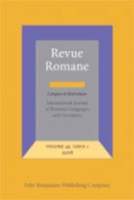
REVUE ROMANE
Scope & Guideline
Unveiling the Interplay of Words and Worlds
Introduction
Aims and Scopes
- Linguistic Variation and Change:
The journal investigates linguistic phenomena across various Romance languages, including syntactic, morphological, and phonological variations. This includes studies on historical linguistics and contemporary usage. - Cultural and Literary Studies:
A significant focus is placed on the analysis of literary texts within their cultural contexts, examining themes, narratives, and the interplay between literature and society. - Interdisciplinary Approaches:
The journal encourages the application of methodologies from fields such as ecocriticism, pragmatics, and postcolonial studies, enriching the analysis of Romance languages and literatures. - Historical Perspectives:
Research often includes a diachronic perspective, tracing the evolution of language and literature from historical texts to modern interpretations. - Migration and Transnationalism:
The impact of migration on language and literature is a recurrent theme, exploring how cultural exchanges shape Romance languages and literary expressions.
Trending and Emerging
- Ecocriticism and Environmental Literature:
Recent publications have increasingly focused on ecocritical perspectives, analyzing how literature engages with environmental issues and human-nature relationships, particularly in the context of the Anthropocene. - Postcolonial and Transnational Studies:
There is a growing interest in postcolonial narratives and transnational literary movements, highlighting the experiences of marginalized voices and the complexities of cultural identity. - Pragmatics and Discourse Analysis:
A notable trend is the application of pragmatics and discourse analysis to literary texts, examining how language functions within social contexts and contributes to meaning-making. - Migration Narratives:
Research on migration and its impact on language and literature is emerging as a significant theme, addressing contemporary issues of identity, belonging, and cultural exchange. - Digital Humanities and New Media:
The integration of digital humanities into Romance studies is gaining traction, exploring how technology and new media influence literature and language practices.
Declining or Waning
- Focus on Classical Literature:
There appears to be a declining emphasis on classical texts and their linguistic features, as more contemporary and interdisciplinary studies gain prominence. - Traditional Grammatical Studies:
Research strictly adhering to traditional grammatical frameworks is becoming less frequent, as scholars increasingly favor more dynamic and context-driven approaches. - Regional Dialects and Minor Languages:
Studies focusing exclusively on lesser-known regional dialects and languages within the Romance family have decreased, possibly overshadowed by broader linguistic and cultural themes. - Historical Literary Figures:
There is a noticeable shift away from studies centered on historical literary figures, as the journal's authors explore broader themes such as migration, transnationalism, and contemporary cultural critiques. - Static Literary Canon:
The exploration of a fixed literary canon is waning, with an increasing interest in diverse voices and alternative narratives that challenge traditional literary hierarchies.
Similar Journals
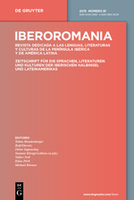
IBEROROMANIA
Unveiling Complexities in Linguistics and Literary NarrativesIBEROROMANIA, published by WALTER DE GRUYTER GMBH, stands as a pivotal journal in the fields of Linguistics and Language and Literature and Literary Theory. Since its inception in 1969, IBEROROMANIA has facilitated scholarly discourse by providing a platform for cutting-edge research that explores the complexities of Romance languages and their literatures. The journal is recognized for its valuable contributions, currently holding a Q3 quartile ranking in Linguistics and Language and a Q2 ranking in Literature and Literary Theory as of 2023. With its diverse scope spanning several years, including works from 1970 to 2024, IBEROROMANIA is pivotal for researchers, professionals, and students alike, fostering a deeper understanding of Romantic linguistic and literary frameworks. Although it does not provide open access, its impact in the Arts and Humanities is underscored by its Scopus rankings, reflecting a commitment to high-quality scholarship. For those dedicated to exploring the nuances of Romance languages and literature, IBEROROMANIA is an indispensable resource.

GERMANISCH-ROMANISCHE MONATSSCHRIFT
Cultivating Insights in Germanic and Romance StudiesGERMANISCH-ROMANISCHE MONATSSCHRIFT, published by UNIVERSITATSVERLAG C WINTER HEIDELBERG GMBH, is a vital academic journal dedicated to the fields of linguistics, literature, and literary theory. With its ISSN 0016-8904, this journal fosters scholarly discussions and disseminates innovative research that intersects Germanic and Romance languages and literatures. While it does not currently offer Open Access options, its contributions have positioned it within the Q4 quartile in both Linguistics and Language, and Literature and Literary Theory according to the 2023 category rankings. The journal's Scopus ranking reflects its emerging place within the academic community, situated at the 40th percentile for Literature and Literary Theory, and the 20th and 18th percentiles within Language and Linguistics, respectively. Scholars and students are encouraged to engage with this resource as it offers a platform for new perspectives that are pivotal to understanding the complex interrelations of these linguistic traditions, enriching both teaching and research initiatives.

GLOTTA-ZEITSCHRIFT FUR GRIECHISCHE UND LATEINISCHE SPRACHE
Exploring the Depths of Ancient LinguisticsGLOTTA-ZEITSCHRIFT FUR GRIECHISCHE UND LATEINISCHE SPRACHE, published by Vandenhoeck & Ruprecht GmbH & Co KG, stands as a pivotal academic journal within the field of Classics and Linguistics, demonstrating a strong commitment to advancing scholarly discourse surrounding the Greek and Latin languages. With a respectable Scopus ranking placing it in the top 77th percentile for Classics, this journal facilitates the dissemination of high-quality research and insights relevant to linguists, philologists, and historians alike. The journal operates without an open access model, ensuring its niche scholarship remains exclusive yet profoundly impactful. The HIndex is indicative of its longstanding influence, with the journal traces its roots back to its inception, with weighted contributions across several pivotal years. Furthermore, the journal's current standing—positioned in the Q2 quartile for Classics and Q3 quartile for Linguistics—reflects its thriving relevance and aspiration towards academic excellence, offering a significant platform for the exchange of ideas within the global scholarly community. Researchers, professionals, and students are encouraged to engage with the journal's contributions, as it consistently reflects the evolving dialogue in the study of ancient languages.

Revista Letras
Empowering Scholars with Open Access InsightsRevista Letras (ISSN: 0100-0888, E-ISSN: 2236-0999) is a prominent academic journal published by Universidade Federal do Paraná, Editora, renowned for its commitment to advancing knowledge in the fields of literature, linguistics, and cultural studies. As a pivotal platform for scholarly exchange, the journal aims to foster rigorous research and interdisciplinary dialogue, addressing themes relevant to both Brazilian and global literature. With an emphasis on open access, Revista Letras ensures that its research is widely disseminated, enabling greater accessibility for researchers, professionals, and students alike. Located in Curitiba, Paraná, Brazil, the journal actively participates in the academic community, contributing to the ongoing conversation surrounding literary and linguistic studies. Its dedication to quality scholarship makes it an invaluable resource for anyone looking to deepen their understanding of these dynamic fields.
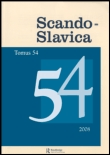
Scando-Slavica
Fostering Dialogue Between Scandinavian and Slavic StudiesScando-Slavica is a renowned academic journal published by ROUTLEDGE JOURNALS, TAYLOR & FRANCIS LTD, specializing in the rich interplay of Scandinavian and Slavic studies. With its ISSN 0080-6765 and E-ISSN 1600-082X, the journal has been a critical resource for scholars since its inception in 1954, covering a wide range of disciplines including archaeology, cultural studies, history, linguistics, and literature. As of 2023, it has consistently ranked in the third quartile across various categories, indicating its influential role in disseminating innovative research within the arts and humanities. With a focus on interdisciplinary dialogue, Scando-Slavica aims to foster a deeper understanding of cultural exchanges and linguistic connections, making it an essential read for researchers, professionals, and students interested in exploring the complexities of Nordic and Slavic interactions. While currently not an open access journal, its contributions have garnered substantial citations, bolstering its academic impact and relevance in a diverse scholarly landscape.
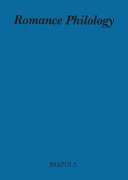
ROMANCE PHILOLOGY
Exploring the Depths of Romance Languages and LiteraturesROMANCE PHILOLOGY is a distinguished academic journal dedicated to the exploration of language, literature, and linguistic theory within the Romance language family. Published by BREPOLS PUBL, it offers a platform for scholars, researchers, and practitioners to disseminate their findings and engage with the latest developments in these fields. The journal's impact factor reflects its standing, positioned within the Q4 category in Linguistics and Language and Q3 in Literature and Literary Theory for 2023, making it an essential resource for those studying Romance philology. Although coverage in Scopus was discontinued in 2021, the journal maintains a commitment to rigorous academic standards and comprehensive peer-review processes. With a broad scope encompassing theoretical and practical aspects of Romance languages and literatures, ROMANCE PHILOLOGY invites contributions that push the boundaries of knowledge and enrich the academic dialogue surrounding these vital areas of study. For those passionate about linguistic and literary pursuits, this journal stands as a significant gateway into the evolving discourse of Romance studies.
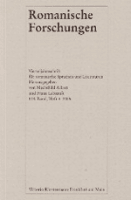
ROMANISCHE FORSCHUNGEN
Unveiling the Nuances of Romance LanguagesROMANISCHE FORSCHUNGEN, published by VITTORIO KLOSTERMANN GMBH, stands as a key scholarly journal in the fields of linguistics and literary studies, focusing particularly on Romance languages and literature. With an ISSN of 0035-8126 and an E-ISSN of 1864-0737, this journal is vital for researchers and scholars seeking to explore and advance their understanding of the nuances within Romance language studies. Operating from its base in Frankfurt am Main, Germany, ROMANISCHE FORSCHUNGEN features a robust publication history from 2002 to 2024. While currently categorized in Q4 within both Linguistics and Language and Literature and Literary Theory for 2023, the journal aims to cultivate a scholarly dialogue that bridges these disciplines, fostering an environment for innovative and critical inquiry. Although not an open-access journal, it serves as a crucial resource for professionals and students dedicated to Romance philology and comparative literature.

Theleme-Revista Complutense de Estudios Franceses
Exploring the Depths of French Linguistics and LiteratureTheleme-Revista Complutense de Estudios Franceses is a distinguished academic journal published by UNIV COMPLUTENSE MADRID, SERVICIO PUBLICACIONES, dedicated to the exploration of French studies within the fields of linguistics and literature. With an ISSN of 1139-9368 and an E-ISSN of 1989-8193, this journal has proudly maintained its Open Access policy since 1992, ensuring that scholarly research is accessible to a global audience. Based in Spain, the journal is committed to advancing knowledge and fostering discussion in French linguistic and literary theory, as evidenced by its publication history from 2019 to 2024. Despite its current classification in the Q4 quartile for both Linguistics and Literature and Literary Theory as of 2023, Theleme is positioned to grow in its academic influence, reflecting trends in interdisciplinary research. The journal’s rankings in Scopus underscore its unique contributions and the importance of its discourse in the arts and humanities. Researchers, professionals, and students are encouraged to engage with Theleme as a resource for innovative ideas and comprehensive studies that navigate the rich landscape of French language and literature.

MESTER
Elevating Voices in Cultural Studies and LinguisticsMESTER is a distinguished academic journal published by the UCLA College of Humanities, known for its commitment to advancing research in the fields of Cultural Studies, Linguistics and Language, and Literature and Literary Theory. With an ISSN of 0160-2764, this journal serves as a vital platform for scholars and professionals to disseminate innovative research and critical perspectives from diverse theoretical frameworks and cultural contexts. Although currently operating without an Open Access model, MESTER continues to uphold a rigorous peer-review process, ensuring that published articles maintain high academic standards. Recognized for its selective focus, MESTER holds a Q4 categorization in Cultural Studies and Linguistics, and Q3 in Literature and Literary Theory, situating it as a relevant, if emerging, voice within these disciplines. Housed within the significant repository of knowledge at UCLA, the journal beckons researchers, students, and practitioners to engage with its contributions to the humanities and build upon its foundations in cultural discourse.

Archivum
Cultivating a Collaborative Environment for Linguistic InquiryArchivum, published by UNIV OVIEDO in Spain, stands as a vital resource in the fields of Linguistics and Language as well as Literature and Literary Theory. With an impact factor reflective of its commitment to scholarly excellence, this journal has proudly maintained an Open Access model since 1951, ensuring that its rich repository of knowledge is freely available to researchers, professionals, and students alike. Covering a converged span from 2019 to 2023, Archivum has strategically positioned itself within the academic milieu, currently categorized in the Q4 for Linguistics and Language and Q3 for Literature and Literary Theory as of 2023. The journal is indexed in Scopus, with rankings that reflect its growing influence, such as #690 in Literature and Literary Theory and #887 in Language and Linguistics. Despite its challenges in visibility, Archivum remains essential for those seeking to engage with contemporary discussions and research within the humanities. Located in the heart of Asturias, it embodies the scholarly spirit of Spain, fostering a collaborative environment for innovation and inquiry in linguistic and literary studies.